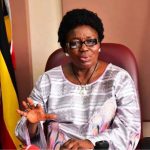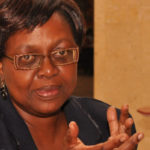The Archbishop of Canterbury, Justin Welby has urged the Archbishop of Uganda, Dr. Stephen Kaziimba to withdraw his Church’s support for the Anti-Homosexual Act ratified by the President Yoweri Museveni at the end of last month.
The Archbishop of Uganda, Dr. Stephen Kaziimba, announced in May that his Church was “grateful” for the passing of the Act, which criminalises the “promotion” of homosexuality and introduces long prison sentences for offences, as well as the death penalty for “aggravated” offences.
In a statement released by Lambeth Palace, Archbishop Welby expresses his “grief and dismay” at the Church of Uganda’s stance, and outlines the arguments that he presented to Dr Kaziimba.
He reminded Archbishop Kaziimba that Anglicans around the world have long been united in our opposition to the criminalisation of homosexuality and LGBTQ people.
“Supporting such legislation is a fundamental departure from our commitment to uphold the freedom and dignity of all people. There is no justification for any province of the Anglican Communion to support such laws: not in our resolutions, not in our teachings, and not in the gospel we share.”
Dr. Kaziimba’s statement in support of the Act expressed his view that homosexuality was being forced on the Ugandan people “by outside, foreign actors against our will, against our culture, and against our religious beliefs”.
Archbishop Welby rejected Dr. Kaziimba’s stand saying, “I am deeply aware of the history of colonial rule in Uganda, so heroically resisted by its people. But this is not about imposing Western values on our Ugandan Anglican sisters and brothers. It is about reminding them of the commitments we have made as Anglicans to treat every person with the care and respect they deserve as children of God.”
Archbishop Welby refers to Resolution 1.10 passed by the 1998 Lambeth Conference. The resolution is often cited by conservative Provinces, since it rejects “homosexual practice as incompatible with scripture” and “cannot advise the legitimizing or blessing of same sex unions nor ordaining those involved in same gender unions”.
But the resolution also states that “all baptised, believing and faithful persons, regardless of sexual orientation, are full members of the Body of Christ,” and “calls on all our people to minister pastorally and sensitively to all irrespective of sexual orientation and to condemn irrational fear of homosexuals”.
Archbishop Welby says that he wrote to Dr. Kaziimba that he was “unable to see how the Church of Uganda’s support for the Anti-Homosexuality Act is consistent with its many statements in support of Resolution 1.10”.
He also referred to the 2016 Primates’ Meeting in Canterbury (before Dr. Kaziimba was installed as Archbishop), at which the Primates “condemned homophobic prejudice and violence and resolved to work together to offer pastoral care and loving service irrespective of sexual orientation”.
The Primates also reaffirmed their rejection of “criminal sanctions against same-sex attracted people”.
Archbishop Welby then addressed Dr. Kaziimba directly that these statements and commitments are the common mind of the Anglican Communion on the essential dignity and value of every person.
“I therefore urge Archbishop Kaziimba and the Church of Uganda a country and Church I love dearly, and to which I owe so much to reconsider their support for this legislation and reject the criminalisation of LGBTQ people,” Archbishop Welby urged.
And he challenges GAFCON and the Global South Fellowship of Anglican Churches, two conservative Anglican groups of which the Church of Uganda is a member, “to make explicitly and publicly clear that the criminalisation of LGBTQ people is something that no Anglican Province can support”.







